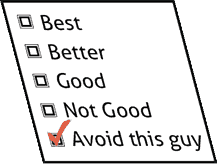I’ve gotta get this off my chest
 I’ve been considering writing this post for some time but recently there were just too many reminders throughout the course of my day to not. I find reputation management not only critical to business today but also fascinating. I guess the whole thing started back in the fall when one of the folks on the RE BarCamp planning committee told me that someone reached out to him to warn him of “who he was dealing with”. As it turns out, there is another Patrick Healy in the New York real estate world. The gentleman told my colleague that he recently won a judgment against my brother involving a real estate deal. Besides the fact that my brother has nothing to do with any brokerage in New York State (or any other state for that matter), the time of that judgment would be some time around the middle of my brother’s senior year of college. He didn’t work during college. Clearly, this was not my brother and the person was mistaken. Nonetheless, he was still bashing me publically.
I’ve been considering writing this post for some time but recently there were just too many reminders throughout the course of my day to not. I find reputation management not only critical to business today but also fascinating. I guess the whole thing started back in the fall when one of the folks on the RE BarCamp planning committee told me that someone reached out to him to warn him of “who he was dealing with”. As it turns out, there is another Patrick Healy in the New York real estate world. The gentleman told my colleague that he recently won a judgment against my brother involving a real estate deal. Besides the fact that my brother has nothing to do with any brokerage in New York State (or any other state for that matter), the time of that judgment would be some time around the middle of my brother’s senior year of college. He didn’t work during college. Clearly, this was not my brother and the person was mistaken. Nonetheless, he was still bashing me publically.
This is not the first time someone has mistaken me for someone else by name alone. For what it’s worth, I am not a Broadway critic for the New York Times nor am I an NBC San Diego reporter – two other people I tend to see when I get my daily Google Alerts. The problem is my name, Patrick Healy, is the Celtic equivalent of the American John Smith. At any given time, there are dozens of Patrick Healy’s in New York City alone. So the problem is, how does someone like me keep an eye on his reputation? As I mentioned, Google Alerts and Google Search aren’t much help to someone like me. I suppose I could get fancy with the Alert criteria and eliminate results involving The New York Times and NBC San Diego but if I did get a mention on either of these two fronts I would sure as heck want to know about it since they are huge.
Your reputation is YOURS
 I’ll go out on a limb here and guess that just about everyone has a name twin. For that reason, reputation management has become more and more important. The world has gotten smaller with the help of the Internet. If you are thinking of doing business with someone or making a new hire, you’d be crazy not to do some recon on these folks. There are some popular services out there that make this pretty easy and they are free.
I’ll go out on a limb here and guess that just about everyone has a name twin. For that reason, reputation management has become more and more important. The world has gotten smaller with the help of the Internet. If you are thinking of doing business with someone or making a new hire, you’d be crazy not to do some recon on these folks. There are some popular services out there that make this pretty easy and they are free. ![]() Rapportive is one that was so smart that they recently were purchased by LinkedIn. Ironically, their blog is on the Posterous platform whom was just acquired by Twitter. Hopefully that link in the last sentence works in six months time. Twitter has some reputation management to do in the acquisitions department but I digress.
Rapportive is one that was so smart that they recently were purchased by LinkedIn. Ironically, their blog is on the Posterous platform whom was just acquired by Twitter. Hopefully that link in the last sentence works in six months time. Twitter has some reputation management to do in the acquisitions department but I digress.
 There are more specialized tools out there for example the Australian-based real estate reputation management service Real Satisfied. **Disclosure: I guest blog for Real Satisfied but have no financial interest in the firm.** Reputation is really all you have in the real estate business so suffice to say there are lots of eyes on these guys. If someone is saying something good or bad about you, you want to know it and acknowledge it. Reputation is something that takes years to build up and can be ruined overnight. It is a valuable and delicate asset.
There are more specialized tools out there for example the Australian-based real estate reputation management service Real Satisfied. **Disclosure: I guest blog for Real Satisfied but have no financial interest in the firm.** Reputation is really all you have in the real estate business so suffice to say there are lots of eyes on these guys. If someone is saying something good or bad about you, you want to know it and acknowledge it. Reputation is something that takes years to build up and can be ruined overnight. It is a valuable and delicate asset.
So back to my problem, how do I deal with this?
If I were writing this a year ago my answer would be “you can’t, you just control what is in your power to control and take it as it comes” but things, they are a changin’. Much like social search is changing the SEO game, it will also help with the reputation management game. Think about it, how did we check someone out in the past – other than run a credit report and criminal background check? So what if their credit score is 750 and they have no priors. How does that speak to them doing their job or fulfilling on their promises? We ask people we know whom we think could know that person. Networks like LinkedIn help out with that to a large extent in that we can look at recommendations on their profiles and see which contacts we have in common. Social Search will help that along immensely – particularly if you are not all that well connected on LinkedIn. The Patrick Healy that your friends have mentioned or had contact with will be the social results that come up vs. the fire hose that Google normally asks you to drink from.
I’m happy about this because I work hard on my reputation and look forward to it being easier come across that. Realistically, the only time you don’t want anyone to find accurate information about you is if you are an unsavory character hoping to pick up some good press off of someone else’s efforts. To all of them I say, “Good Luck” since at some point that all falls apart when you are asked to prove it. It’s easier to refute a negative piece of information than vice versa.
What does this mean to your business?
 Although there is more work involved in managing the reputation of a brand or business than an individual but at least you know what you are working with. How many Cronin Phelan pubs are there in Queens, right? Even if it were called John’s Bar, there wouldn’t be more than one or two in a single city. So absolutely use Google Alerts and Google Search to keep tabs on your business. When you find good press, capture it (get permission of course) and publicize it. Work on your social network and make sure your customers and patrons ‘like’, +1, tweet, and talk about you whenever possible. All of this contributes to your organic SEO but, more importantly, also to your Social SEO.
Although there is more work involved in managing the reputation of a brand or business than an individual but at least you know what you are working with. How many Cronin Phelan pubs are there in Queens, right? Even if it were called John’s Bar, there wouldn’t be more than one or two in a single city. So absolutely use Google Alerts and Google Search to keep tabs on your business. When you find good press, capture it (get permission of course) and publicize it. Work on your social network and make sure your customers and patrons ‘like’, +1, tweet, and talk about you whenever possible. All of this contributes to your organic SEO but, more importantly, also to your Social SEO.
Absolutely check out your potential business partners and new hires with the methods mentioned above. A word of caution when checking out people with common sounding names: take those results with a grain of salt. If you can find someone you know and trust that worked with this person then that’s your best bet. Blind references and recommendations are fairly unreliable so don’t bother with them. Do you have any techniques you use to manage your reputation or vet others’? I’d love to hear about them.
-PH
